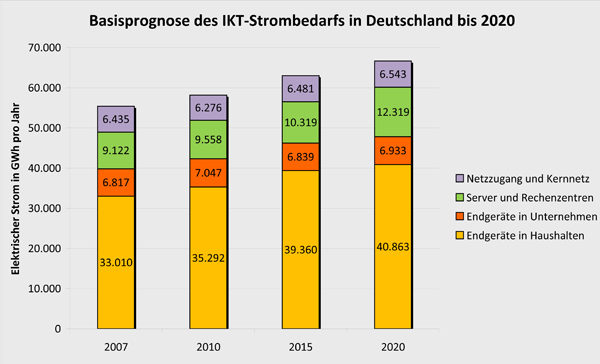GreenIT
Information and communications technologies (ICT) already consume ten per cent of total power consumption– and the consumption will increase by more than 20 per cent by 2020. This was the conclusion of Fraunhofer IZM in Berlin and the Karlsruhe-based FraunhoferInstitute for System and Innovation Research ISI in a joint report produced on behalf of the German Federal Ministry for Economics and Technology (BMWi) entitled “Estimates of the energy demand for the further development of the information society”.The two institutes also make recommendations about how to respond to the most important trends.
In 2007,information and communications technologies in Germany consumed some 55 billion kilowatt-hours of electricity, which was more that 10.5 per cent of total national power consumption. By 2020, the two Fraunhofer institutes predict an increase of more than 20 percentage points. The main consumers in the IT sector with 60 per cent are expected to be private households, with consumption increasing further due to bigger and bigger televisions and more intensive use of PCs and the Web. In contrast, companies, data centres and broadband networks will only account for 40 per cent of the power demand.
The study refers in particular to Green IT as a way of reversing the trend. A nationwide expansion of access and transport networks is essential for a competitive economy. In particular the increased interactive use of the Internet means that users are online continuously for longer periods. Broadband network access and increasingly powerful devices – from VoIP equipment to large flat screens – are used on a daily basis. In addition, the networking and the new Internet protocol system IPv6 lead to a permanent network standby, which also increases power consumption. The study shows that passive standby today draws an average of 0.5 to 1.0 Watt. For network standby the power consumption is generally an order of magnitude greater.
 Fraunhofer Institute for Reliability and Microintegration IZM
Fraunhofer Institute for Reliability and Microintegration IZM